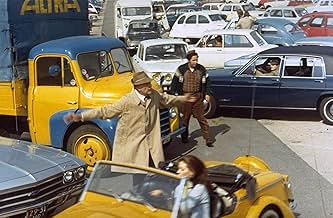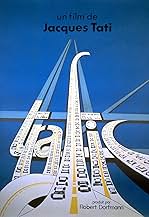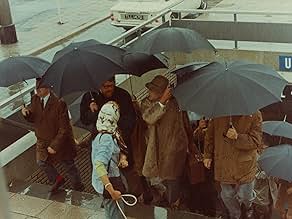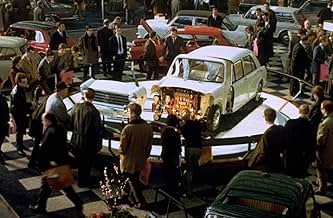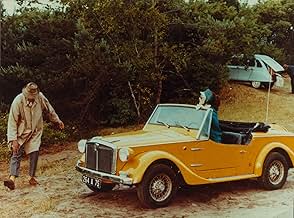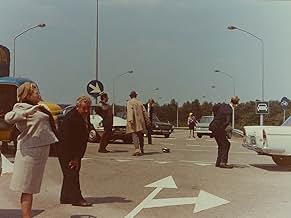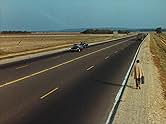VALUTAZIONE IMDb
7,0/10
8065
LA TUA VALUTAZIONE
Aggiungi una trama nella tua linguaMr. Hulot drives a recreational vehicle from Paris to Amsterdam in his usual comical, disastrous style.Mr. Hulot drives a recreational vehicle from Paris to Amsterdam in his usual comical, disastrous style.Mr. Hulot drives a recreational vehicle from Paris to Amsterdam in his usual comical, disastrous style.
- Regia
- Sceneggiatura
- Star
- Nominato ai 1 BAFTA Award
- 1 vittoria e 1 candidatura in totale
Jacques Tati
- Monsieur Hulot
- (as Mr. Hulot)
Honoré Bostel
- Director of ALTRA
- (as Honore Bostel)
François Maisongrosse
- François
- (as F. Maisongrosse)
Marco Zuanelli
- Mechanic
- (as Mario Zanuelli)
Recensioni in evidenza
Despite bearing the opening declaration 'M. Hulot dans', everybody's favourite Frenchman again has a tendency to wander in and out of action rather perfunctorily executed; although he manages to be much more in evidence than his earlier 'PlayTime'
It was only a matter of time before Jacques Tati tackled humanity's eternal nemesis - the motor car - in a film that gives a new meaning to the term 'road movie'.
First we see them assembled on a production line before being unleashed upon a hapless public - all to the accompaniment of a deceptively jaunty score.
A couple of the sight gags are genuinely funny, but one tends to view the proceedings with interest rather than involvement.
It was only a matter of time before Jacques Tati tackled humanity's eternal nemesis - the motor car - in a film that gives a new meaning to the term 'road movie'.
First we see them assembled on a production line before being unleashed upon a hapless public - all to the accompaniment of a deceptively jaunty score.
A couple of the sight gags are genuinely funny, but one tends to view the proceedings with interest rather than involvement.
8sol-
It takes about half an hour for this film to warm up, but once it gets going, it is a great watch. As the fourth entry in Tati's M. Hulot series, the film is not quite as good as the two previous entries, 'PlayTime' and 'Mon Oncle', but it is still a fine film on its own, with not only amusing puns but also interesting satirical elements once again. Like with the previous two films, 'Trafic''s jokes owe a lot to the way in which the shots are set up, and in general Tati does a fine job visualising the material. Some shots appear to lack meaning or thematic motivation, but in general they help to flesh out the humour at technology. It is also interesting how there is a distinct lack of close-ups until the end. Everything going on is so interesting that one wants to look closer, but Tati places the viewer at a distance. The jokes are often funnier because we cannot see the finer details, and this is perhaps Tati saying something in the way of that if we distance ourselves we can see humour that we might miss otherwise if we try to examine everything too closely. As usual, the music used is excellent too, fitting in well with the on-screen action. Overall, the film does not work quite as well as 'PlayTime' and 'Mon Oncle', but there is little reason to regard it as an inferior entry - just a lesser entry, perhaps.
I didn't know what to expect when I went to see this movie many years ago. I was delightfully surprised. This is a very funny movie, but it is subtle in it's kookie-ness.
Two men have developed a new camping van and have set out to take it to an outdoors show. This should be an ordinary trip full of coffee, donuts and long boring stretches of road. But no, this does not take place in America; it starts in Paris and the goal is Amsterdam. Much can happen along such a route, and in this case, just about everything does.
Will they make it there before the show has ended? Will their dreams of being successful come to pass? These are the driving questions of this movie. They seem rather uninteresting goals, don't they? Nevertheless, these characters will likely win you over and have you rooting for them as they make their bumbling stab at entrepreneurship. Or, just as likely, you may find yourself enjoying every obstacle that steps in their way, as I did.
Much is unexpected in this movie and that's what makes it fun! Share this one with your friends and they will thank you.
Note: this is a comedy, there's not much gore or street fights, shoot-outs or bombs taking out city blocks, so be forewarned, this movie with not shake your subwoofer.
Although not a spy movie, it somewhat reminds me of the original "Tall Blonde Man with One Black Shoe": another wonderful French comedy.
Two men have developed a new camping van and have set out to take it to an outdoors show. This should be an ordinary trip full of coffee, donuts and long boring stretches of road. But no, this does not take place in America; it starts in Paris and the goal is Amsterdam. Much can happen along such a route, and in this case, just about everything does.
Will they make it there before the show has ended? Will their dreams of being successful come to pass? These are the driving questions of this movie. They seem rather uninteresting goals, don't they? Nevertheless, these characters will likely win you over and have you rooting for them as they make their bumbling stab at entrepreneurship. Or, just as likely, you may find yourself enjoying every obstacle that steps in their way, as I did.
Much is unexpected in this movie and that's what makes it fun! Share this one with your friends and they will thank you.
Note: this is a comedy, there's not much gore or street fights, shoot-outs or bombs taking out city blocks, so be forewarned, this movie with not shake your subwoofer.
Although not a spy movie, it somewhat reminds me of the original "Tall Blonde Man with One Black Shoe": another wonderful French comedy.
Whilst not Tati's best by any stretch of the imagination the genius of the man still shines through. Having lived in France for a while I see more humour in this film, particularly in the comedic observation, than before. The French may be fanatical about cinema and may well have produced some of the world's greatest film makers but out and out comedy probably ranks well down in terms of output. Maybe it's something to do with the French sense of humour (whatever that may be). Unlike British, and to a lesser extent US comedy, self-parody is not a French strength. It could be something to do with their history and education but the culture, so strong in literature and the arts seems not to demean itself with pure laughter. Most cinema fans would probably be hard put to list 10 French comedies - other than perhaps drama with the occasional comic undertones. Les Visiteurs (the original not the recent re-make) is probably one of the better examples but here again there's little or no self-mocking.
So it was left to Tati to mine the seam - and how well he mined it. Here he takes the smallest of French (dare I say Parisian) mannerisms and extends them into lengthy scenes of beautifully observed comedy. Whether it's the windscreen wipers in tune with the occupants or the nose-picking drivers, he asks the French to at least smile, if not laugh out loud, at themselves.
Yes, the film does move at rather a slow pace and there are times when the comic observation sags, but the sight of dear old M Hulot in his mackintosh, loping along with pipe jutting from his mouth will ever remain one of cinema's delights.
So it was left to Tati to mine the seam - and how well he mined it. Here he takes the smallest of French (dare I say Parisian) mannerisms and extends them into lengthy scenes of beautifully observed comedy. Whether it's the windscreen wipers in tune with the occupants or the nose-picking drivers, he asks the French to at least smile, if not laugh out loud, at themselves.
Yes, the film does move at rather a slow pace and there are times when the comic observation sags, but the sight of dear old M Hulot in his mackintosh, loping along with pipe jutting from his mouth will ever remain one of cinema's delights.
What can we make of Trafic, Jacques Tati's last film? It certainly isn't a major success, as M. Hulot's Holiday and Mon Oncle are. It's not a gallant failure, as I believe Playtime is. It seems to me that it is a sad, sometimes amusing combination of those things that made Tati so unique, so funny, so problematic and so drawn to making mundane social commentary. There must be something in the water we drink or the bread we eat that causes some humans with extraordinary artistic gifts to believe that because they are great artists they also must have equally great gifts of social philosophy, gifts which they are determined to share with us.
By the time Tati made Trafic, four years after Playtime, he had lost ownership of his life's work, his films, and most of his money. Playtime was a debacle. He spent a fortune, his own as well as others, to craft a perfectionist's dream of artistic control. He ended up with a movie that was filled with surprises, layer on layer of -- for wont of a better term -- sight and sound gags, with fascinatingly complex amusements for an audience willing to let the situations develop around them, and seemingly endless, obvious and often impersonal visual commentary on the homogenizing of modern society and the perils of technology. Most moviegoers were not all that interested.
Now, with Trafic, Mr. Hulot has come back. He is a designer for a Paris auto company, and he has developed a camping vehicle like no other. Trafic is the story of Mr. Hulot's delivery of his camper from Paris to an international auto show in Amsterdam. It's a long journey filled with misunderstandings, accidents and crashes, a PR executive with an endless number of dress changes, cops, windshield wipers and a lot of cars. The movie is as exquisitely built as an expensive vest pocket timepiece. Unfortunately, time has a way of catching us up, and Mr. Hulot now is a man past middle age, where male innocence seems unlikely and somewhat unattractive. Tati was 64 now, and he looks it. The gentle, innocent mime who meets unexpected personal situations at a small seaside hotel or tries to help his young nephew has been replaced by a well-meaning older gentleman we more often observe than we root for. His encounters with the clichés of faceless technology and bumbling bureaucracy are increasingly with people with few understandable, sympathetic foibles. Mr. Hulot to be at his best needs people we can come to like and interact with, not simply interchangeable stand- ins...even if they're picking their noses in the privacy of their cars (in a sight gag probably only Tati could have pulled off).
Mr. Hulot only appeared in four feature-length movies. It is Tati's genius that in less than 500 minutes he gave us such a memorable and appealing human being. Tati's layering of sight gags is unique and often intensely and unexpectedly funny. With Trafic, however, I found my interest more intellectual than anything else. There were stretches of the film that simply weren't all that engaging. And this, of course, is all just opinion.
By the time Tati made Trafic, four years after Playtime, he had lost ownership of his life's work, his films, and most of his money. Playtime was a debacle. He spent a fortune, his own as well as others, to craft a perfectionist's dream of artistic control. He ended up with a movie that was filled with surprises, layer on layer of -- for wont of a better term -- sight and sound gags, with fascinatingly complex amusements for an audience willing to let the situations develop around them, and seemingly endless, obvious and often impersonal visual commentary on the homogenizing of modern society and the perils of technology. Most moviegoers were not all that interested.
Now, with Trafic, Mr. Hulot has come back. He is a designer for a Paris auto company, and he has developed a camping vehicle like no other. Trafic is the story of Mr. Hulot's delivery of his camper from Paris to an international auto show in Amsterdam. It's a long journey filled with misunderstandings, accidents and crashes, a PR executive with an endless number of dress changes, cops, windshield wipers and a lot of cars. The movie is as exquisitely built as an expensive vest pocket timepiece. Unfortunately, time has a way of catching us up, and Mr. Hulot now is a man past middle age, where male innocence seems unlikely and somewhat unattractive. Tati was 64 now, and he looks it. The gentle, innocent mime who meets unexpected personal situations at a small seaside hotel or tries to help his young nephew has been replaced by a well-meaning older gentleman we more often observe than we root for. His encounters with the clichés of faceless technology and bumbling bureaucracy are increasingly with people with few understandable, sympathetic foibles. Mr. Hulot to be at his best needs people we can come to like and interact with, not simply interchangeable stand- ins...even if they're picking their noses in the privacy of their cars (in a sight gag probably only Tati could have pulled off).
Mr. Hulot only appeared in four feature-length movies. It is Tati's genius that in less than 500 minutes he gave us such a memorable and appealing human being. Tati's layering of sight gags is unique and often intensely and unexpectedly funny. With Trafic, however, I found my interest more intellectual than anything else. There were stretches of the film that simply weren't all that engaging. And this, of course, is all just opinion.
Lo sapevi?
- QuizThe end scene (people walking with umbrellas between parked cars) was shot on the parking lot of the then still functioning Amsterdam Ford factory.
- BlooperSeveral (Dutch) license plates can be seen on various different vehicles, sometimes even in the same shot. For instance the license plate "FT-92-65" can be seen in the petrol station scene on both a Peugeot 504 and a Chrysler 180. Later the same plate is on a Peugeot 204 passing in front of the exhibition center. In the "road rage" scene the number 76-04-NF is on both the Renault 16 and the Citroën ID. Shortly after the same plate is on an Opel Kadett parked in front of the exhibition center.
- Citazioni
Radio Announcer: The Cyclone 70. A new raincoat... especially made for the sun.
- Curiosità sui creditiIn the opening credits, Tati is billed simply as "M. Hulot." He does, of course, use his real name for his writing and directing credits.
- ConnessioniFeatured in Omnibus: Monsieur Hulot's Work (1976)
I più visti
Accedi per valutare e creare un elenco di titoli salvati per ottenere consigli personalizzati
- How long is Traffic?Powered by Alexa
Dettagli
- Data di uscita
- Paesi di origine
- Sito ufficiale
- Lingue
- Celebre anche come
- Traffic
- Luoghi delle riprese
- Aziende produttrici
- Vedi altri crediti dell’azienda su IMDbPro
Botteghino
- Lordo in tutto il mondo
- 51.348 USD
- Tempo di esecuzione1 ora 36 minuti
- Mix di suoni
- Proporzioni
- 1.37 : 1
Contribuisci a questa pagina
Suggerisci una modifica o aggiungi i contenuti mancanti

